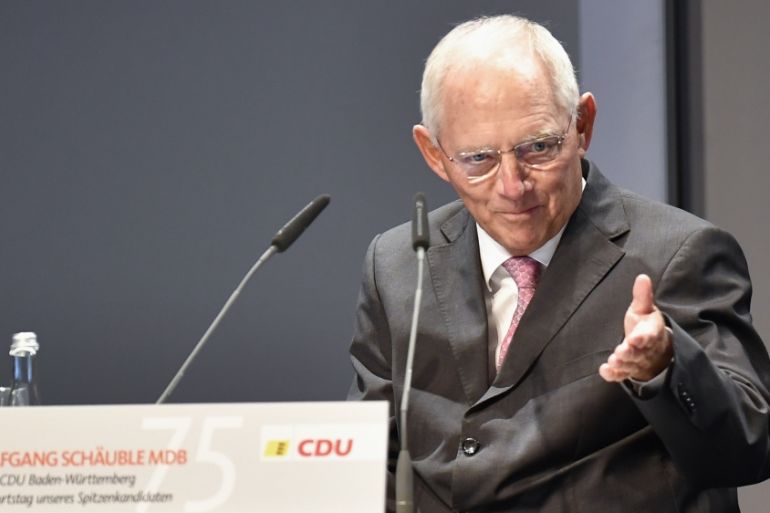Germany’s Finance Minister Wolfgang Schaeuble ‘to quit’
The eurozone’s most powerful advocate of austerity is expected to become speaker of the new German parliament.

Wolfgang Schaeuble, the eurozone’s staunchest advocate of austerity policies, is set to leave his post as Germany’s finance minister, according to officials in Europe’s biggest economy.
The news on Wednesday came three days after Chancellor Angela Merkel won a fourth term in a federal election, but her conservative CDU/CSU alliance plunged from 42 percent support in 2013 to 33 percent on Sunday – their worst showing since 1949.
In a statement, CDU and CSU officials Volker Kauder and Alexander Dobrindt said they had nominated Schaeuble, 75, to become speaker of the new parliament.
“We are pleased that Wolfgang Schaeuble agreed to stand for this office,” Volker Kauder and Alexander Dobrindt said in a statement.
OPINION: What manner of a union for the EU?
Schaeuble, a longtime ally of Merkel, has been the most powerful backer of tight fiscal discipline for stricken eurozone member states.
His unbending stance on Greece cast him as a villain over his insistence to tax increases and spending cuts, and many debt-mired countries in southern Europe will cheer his departure.
‘Good cop/bad cop’
Aristides Hatzis, associate professor of law and economics at the University of Athens, said that Schaeuble’s “demonisation” in Greece and elsewhere as the “architect and warden of austerity policies” in the wake of Europe’s sovereign debt crisis was an “exaggeration”.
“Schaeuble hasn’t necessarily followed his own agenda. Of course, he represents the hardliners in the German government and he flirted recklessly with the idea of Grexit [Greece’s exit from the European Union],” Hatzis told Al Jazeera.
“His stance, for the past seven years, created some considerable damage to the relations between Greece and Germany but also to the prospects of Germany’s political hegemony in Europe,” he added.
Hatzis also said that Schaeuble was instrumental, perhaps inadvertently, in creating a more moderate image for Merkel.
“Their good/bad cop game was quite successful, at least in the Greek case,” he said.
Looking ahead, Hatzis said Schaeuble’s departure from the Ministry of Finance was unlikely to have a big effect on Germany’s economic policy or its stern attitude towards Greece.
“If we notice any change this will probably be the result of the change in power equilibrium in Berlin and the strong tilt towards the right,” he said. “I am also afraid that his successor might upset the delicate balance of the Greek-German relations which after a tumultuous period reached a rather stable tranquillity.”
![Schaeuble, an ally of Merkel, survived an assassination attempt in 1990 that left him badly injured [File: Reuters]](/wp-content/uploads/2017/09/e7bcdbf17b7942d69de4ec59b3065e05_18.jpeg)
The general election on Sunday saw Merkel win but without a ruling majority.
Her previous junior partners, the Social Democrats, said they would move to the opposition following a dismal result in the poll.
Merkel must now try to form a government likely to include the Free Democrats (FDP), which has already staked a claim to the powerful finance minister job.
FDP leader Christian Lindner, who could well be the prime candidate for the finance post, said that Schaeuble had his party’s full backing to become speaker.
‘AfD tamer’
The election also saw the far-right nationalist Alternative for Germany (AfD) party win nearly 13 percent of the vote, in what the top-selling Bild daily called a “political earthquake” for the country.
Bild said Merkel personally asked Schaeuble to lend his gravitas to the office of parliamentary speaker, arguing that the “job will have greater importance than usual given the arrival of the AfD in the Bundestag” lower house.
|
|
German media said he was slated to serve as the “AfD tamer”.
Schaeuble is the longest-serving member of the Bundestag with a 45-year tenure.
He will replace the highly respected Norbert Lammert, who retired at the end of the last parliamentary term this month.
The transition means however that Schaueble will no longer belong to Merkel’s cabinet, or take part in what are expected to be thorny negotiations on a new coalition.
Although Schaeuble occasionally broke protocol by publicly differing with Merkel during crises such as the eurozone debt turmoil and 2015’s record refugee influx, he was instrumental in handing Germany’s first balanced budget in four decades in 2014.
Schaeuble, consistently one of Germany’s most popular politicians, held five ministerial offices since 1984, forging his career under the former conservative leader Helmut Kohl.
Known for his biting wit and unerring sense of duty, Schaeuble worked with Kohl to oversee Germany’s national reunification after the fall of the Berlin Wall.
But personal tragedy struck Schaeuble with an assassination attempt by a deranged man in 1990 that badly injured him and has confined him to a wheelchair ever since.
Describing himself as “pitiless” in his management of Germany’s public purse, he showed the same exactitude towards his euro partners, campaigning for austerity and insisting on stringent conditions for any bailout contribution by Berlin.